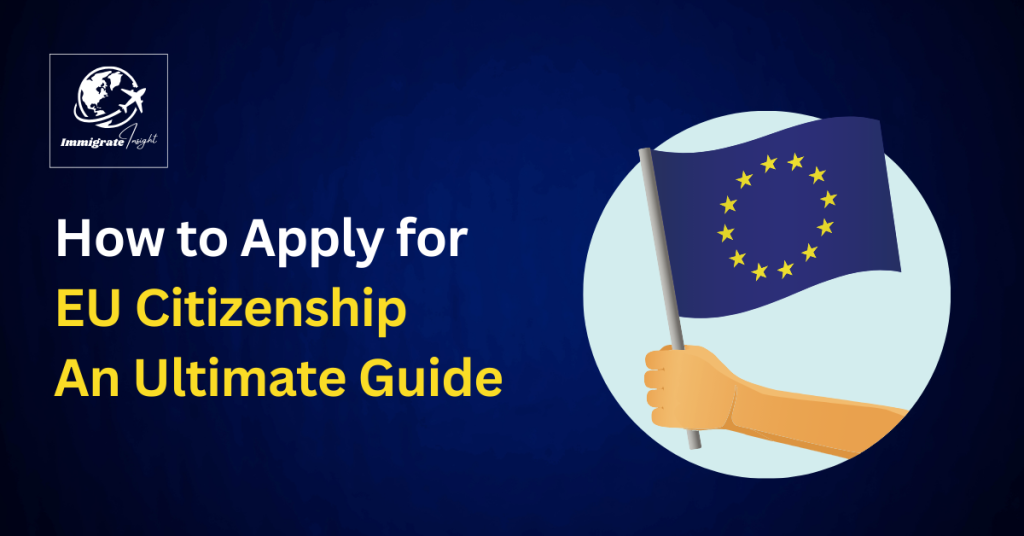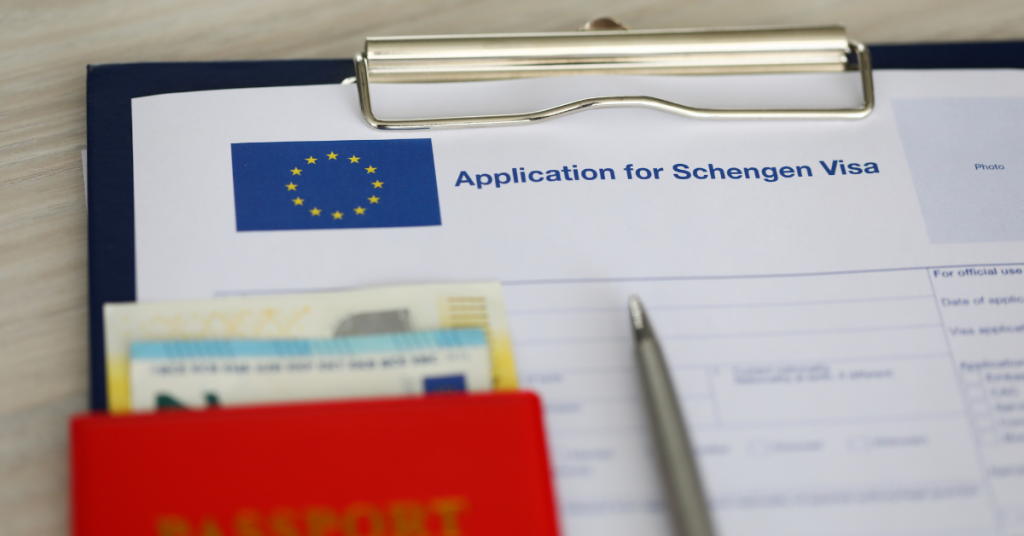How to Apply for EU Citizenship and Unlock a World of Opportunity: The European Union (EU) offers a unique and coveted status: EU citizenship. This prestigious title grants individuals a wealth of benefits, from visa-free travel across 27 member states to the freedom to live, work, and study anywhere within the EU. If you’ve ever dreamt of exploring the vibrant cultures, stunning landscapes, and thriving economies of Europe, then obtaining EU citizenship could be your gateway. But how to apply for EU citizenship? This comprehensive guide will break down the process, explore the different avenues to achieve this status, and equip you with the knowledge to navigate your path towards becoming an EU citizen.

Also Read: A Comprehensive Guide on How to Get Transit Visa for USA 2024
Understanding EU Citizenship
Before diving into the specifics of how to apply for EU citizenship, let’s establish a clear understanding of what it entails. EU citizenship goes beyond simply holding a passport from an EU member state. It signifies membership in a political and economic union, granting individuals a set of fundamental rights and privileges. These rights include:
- Free movement: EU citizens have the right to live, work, study, and retire in any EU country without needing a visa.
- Voting rights: EU citizens can participate in elections for the European Parliament and local elections in their country of residence.
- Diplomatic protection: EU citizens are entitled to consular protection from any EU embassy or consulate in a non-EU country.
- Access to single market: EU citizens benefit from the free movement of goods, services, capital, and people within the EU.
Routes to EU Citizenship: How to Apply for EU Citizenship
The path towards EU citizenship is not a one-size-fits-all approach. Several avenues exist, depending on your individual circumstances. Here, we’ll explore the most common routes on how to apply for EU citizenship:

Citizenship by Descent (Jus Sanguinis):
This route allows individuals to claim citizenship based on their lineage. If you have a parent, grandparent, or even great-grandparent who was an EU citizen, you may be eligible for citizenship by descent. Requirements and eligibility criteria vary by country, so researching the specific regulations of the nation you’re interested in is crucial.
Many countries within the EU offer citizenship by descent, making it a popular path for those with European ancestry. Researching your family history and obtaining relevant documentation is key to applying through this route.
Citizenship by Marriage:
Marrying an EU citizen can pave the way for you to obtain citizenship. However, this process typically involves residing in the spouse’s country for a set period (usually between three and five years) and meeting specific integration requirements. Language proficiency tests and proof of financial independence are often part of the application process.
It’s important to remember that marrying solely for the purpose of obtaining citizenship is illegal in most EU countries. Genuine marriages and a shared life within the EU are essential for success through this route.
Citizenship by Naturalization:
This is the most common path for those without ancestral ties or marital connections to an EU citizen. Naturalization typically involves residing legally in an EU country for a specific period (often between five and ten years) and fulfilling integration requirements. These requirements may include passing a language test, demonstrating knowledge of the country’s history and culture, and having a stable source of income.
Naturalization is a significant step, and each EU country has its own set of regulations. Carefully researching the specific requirements of your target nation is crucial for a successful application through naturalization.
Citizenship by Investment:
Some EU countries offer citizenship programs for high-net-worth individuals who invest a substantial amount of money in the country. These programs can involve real estate investments, venture capital contributions, or government bond purchases. The minimum investment amount and specific requirements vary by country.
Citizenship by investment is a fast-track option, but it comes with a hefty price tag. Carefully weigh the financial implications and ensure you understand the terms and conditions of these programs before pursuing this route.

How to Apply for EU Citizenship: A Step-by-Step Guide
Once you’ve identified the most suitable path for you on how to apply for EU citizenship, it’s time to delve into the application process itself. While the specifics will vary depending on your chosen route and target country, here’s a general breakdown of the typical steps involved:
- Research: Thoroughly research the requirements and application process for your chosen path and target EU country. The official government website of your target nation is an excellent starting point.
- Gather Documentation: Collect all necessary documents, such as proof of identity, birth certificates, marriage certificates (if applicable), proof of residence, evidence of financial stability.
- Language Test: Many EU countries require applicants to demonstrate proficiency in the official language(s) of the country. Identify the required language test and ensure you achieve the necessary score before submitting your application.
- Integration Test: Several EU countries have integration tests that assess your knowledge of the country’s history, culture, and political system. Prepare for these tests by familiarizing yourself with the relevant information. You can find resources and practice tests on the official government websites or through adult education centers in your target country.
- Application Submission: Once you’ve gathered the required documentation and met the language and integration requirements, it’s time to submit your formal application. The application process typically involves filling out online forms, scheduling an appointment with the relevant authorities, and submitting your documents in person. Consult the official government website of your target country for specific instructions on application submission https://www.schengenvisainfo.com/eu-citizenship/.
- Interview: You may be required to attend an interview with immigration officials as part of the application process. This interview is an opportunity for them to assess your understanding of the country, your integration efforts, and your motivations for seeking citizenship.
- Decision and Oath Ceremony: Following the application process, you’ll receive a decision from the authorities. If your application is successful, you’ll likely be required to participate in an oath ceremony, officially pledging allegiance to your new country.

Additional Considerations When Applying for EU Citizenship
- Dual Citizenship: Not all EU countries allow dual citizenship. Research the policies of your target country to understand if you’ll be required to renounce your existing citizenship before obtaining EU citizenship.
- Legal Representation: While you can navigate the application process for EU citizenship yourself, consulting with an immigration lawyer can be beneficial. They can provide guidance on the specific requirements, assist with paperwork, and represent you during the application process.
- Costs: The application process for EU citizenship typically involves fees for processing, language tests, integration tests, and potentially lawyer consultations. Research the associated costs for your chosen path and target country.
Resources for Applying for EU Citizenship
Here are some helpful resources to get you started on your journey towards EU citizenship:
- European Commission – Your Europe – Naturalisation and citizenship in an EU country: https://www.schengenvisainfo.com/eu-citizenship/
- EU Immigration Portal: https://immigration-portal.ec.europa.eu/index_en
- European Parliament – Information for Europeans: https://www.schengenvisainfo.com/eu-citizenship/
- Council of the European Union – Glossary of terms: https://eur-lex.europa.eu/summary/glossary.html
Remember: The process of applying for EU citizenship can be complex and time-consuming. Approaching it with thorough research, careful planning, and a commitment to meeting the requirements will significantly increase your chances of success.

Conclusion: How to Apply for EU Citizenship
The prospect of EU citizenship is undeniably appealing. The freedom of movement, access to education and employment opportunities across Europe, and the security of belonging to a strong economic and political union make it a worthwhile goal. While the path towards EU citizenship can vary depending on your circumstances, this comprehensive guide has equipped you with the knowledge and resources to navigate the process. Remember, thorough research, meticulous preparation, and a commitment to meeting the requirements are key to a successful application.
FAQs: How to Apply for EU Citizenship
- How long does it take to apply for EU citizenship? The processing time for EU citizenship applications varies depending on the chosen route and target country. It can range from a few years for citizenship by investment programs to a decade or more for naturalization.
- Can I lose my EU citizenship? Generally, EU citizenship is permanent. However, some countries may revoke citizenship under specific circumstances, such as if it was obtained fraudulently or if the individual engages in activities deemed detrimental to national security.
- What are the benefits of having dual citizenship? Dual citizenship allows you to enjoy the rights and privileges of both countries, such as visa-free travel and voting rights. However, there can be tax implications and potential military service obligations, so research the specific regulations of both countries.
- Is it difficult to learn the language required for EU citizenship? The difficulty of learning a new language depends on your existing language skills and the target language. Many resources are available to help you learn a new language, including online courses, language exchange programs, and traditional classroom learning.
- Where can I find help with the application process? The official government website of your target EU country is a valuable resource for application forms and detailed instructions. Consulting with an immigration lawyer can provide personalized guidance and assistance throughout the process.
By embarking on this journey towards EU citizenship, you’re opening doors to a world of possibilities. With dedication and the information provided in this guide, you can successfully navigate the application process and become a citizen of this vibrant and united Europe.
